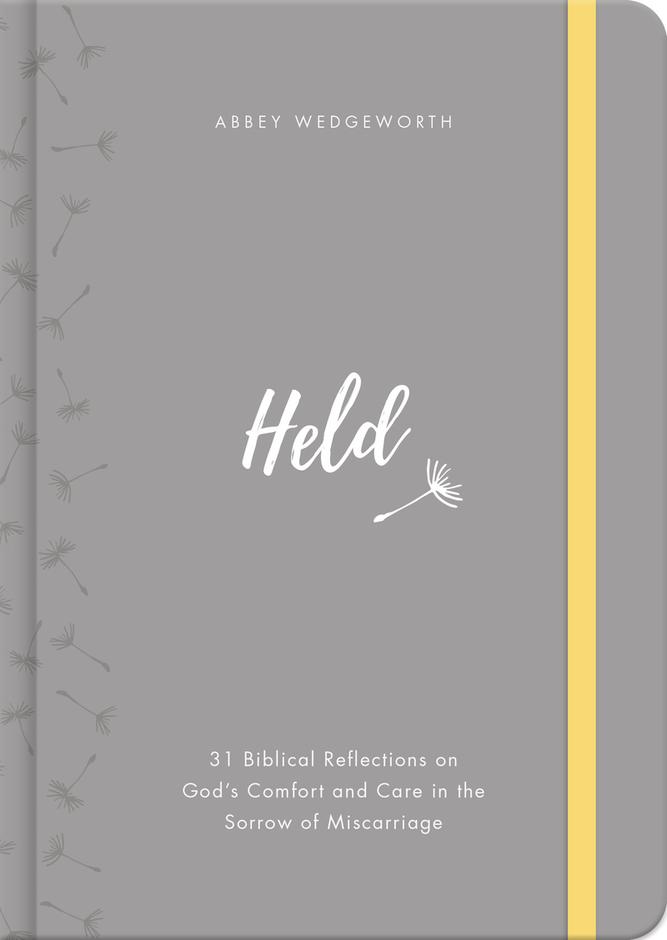Held is a slim and discreet book. On the cover, the title is underscored by a picture of a dandelion seed – something small and ordinary, yet full of hope. The whisper of a promise of all the potential it holds - the new life of a new flower. The book has a lovely yellow ribbon to mark your page and elastic to hold it closed, keeping your prayers and confessions safe. It is a book which has been designed on purpose with rounded edges and thick cream pages to let you know from the beginning that inside the covers you will find love, care and comfort as you walk through grief and sorrow. It is laid out as a daily devotional, studying Psalm 139 to discover God’s promises and truth about the loss of your baby – because that is what miscarriage is.
Each day’s readings are just a few pages, enough to guide you through a verse or two of the psalm. When you are struggling and suffering this is plenty to work through each day! Abbey Wedgeworth’s use of Psalm 139 is carefully thought out. The psalm reminds you that you are upheld by the one true God, and that even though we cannot fathom why our babies have died, God is still sovereign and good and cares for us. Wedgeworth affirms the sanctity of each individual life created by God and challenges our responses to miscarriage. We may lash out in grief, but the only way forward is to trust God to ‘lead me in the way everlasting’ (Psalm 139:24). After each reading there is space to journal. This is guided by scripture to meditate on and questions which encourage reflection or challenge our feelings and responses. Sometimes poems or hymns are included to further point the reader to God’s care and compassion to us, his children.
Held is interspersed with personal accounts of people who have walked through miscarriage in a variety of circumstances, allowing you to connect with others and know you are not alone in your sorrow. There is also a list of further reading included at the end, highlighting other devotionals and books for deeper study to equip readers to develop a theology of grief at their own pace. Whether miscarriage is something you have recently walked through or if it was several years ago, I would recommend this book as a starting point to help you process your journey. If you have not experienced pregnancy loss but want to know how to support friends who have, then read this book and understand better the point of view of those suffering – and then give them the book as a gift!
In a society that minimises the value of life in the womb as ‘a cluster of cells’ it is confusing to know how to respond to miscarriage. As mothers of babies who died so small all we are left with is blood and pain, often alone on the bathroom floor. We can be left frustrated, confused and guilty; like we are not allowed to grieve as it doesn’t really count as a ‘life’.
However, this is not God’s truth. Psalm 139 declares that, ‘My frame was not hidden from you, when I was being made in secret, intricately woven in the depths of the earth. Your eyes saw my unformed substance; in your book were written, every one of them, the days that were formed for me, when as yet there where none of them.’ (vv15-16). God promises that every life is precious and beautiful to him who created them. He knows and sees and has plans for them. We are not promised that we will know or understand them, but we can be certain that we held a baby in our wombs and that they are loved and valued. Therefore we have a clear right to grieve. Our grief is not measured by the length of our babies’ lives.
I felt absolutely broken, empty and so so guilty when I went through my first miscarriage. It was the Christmas holidays and I was overjoyed at the new life growing in me as we celebrated the birth of our Saviour with our beautiful daughter, mistily contemplating how she would respond to a sibling, how our love would increase with more members of our family. Then I caught a bad chest infection and cramps, pain, then bleeding quickly followed. I blamed myself for getting sick, for not being strong enough to look after my growing baby. We didn’t tell anyone, how could we? Would they understand?
Then I was pregnant again, this time at the same time as two friends and we happily chatted about the joys of going through it all together. Then I started spotting. Hospital appointments for blood tests and lots of waiting. Finally more pains and bleeding and the small, perfectly formed sac in the palm of my hand. When it happened again how could we tell anyone, what would they think of me? I spent days in bed crying and unable to know how to move on. My daughter would crawl in beside me and tell me it was ok, that we could have a film day in bed. Her love for me and gentle care saw me through.
We eventually had a baby boy. But then the miscarriages started again. Six in all. Six little lives I think about still. Six little lives that expanded my world with their promise of adventure and love to be left afterwards wrecked and hollow. My body expanding in the early stages of pregnancy and then left flabby and swollen. Guilt stole my joy of my two young children in front of me as I felt a failure. A failure to cook dinner for my family yet again. A failure as we had to pay for more taxi journeys to hospital we could little afford. A failure as a stay at home mother who couldn’t bear her babies to term. A failure to not be healthy and fit enough to care for the young children in front of me who were confused by my sadness and irrational anger. I quickly stopped confiding in anyone as I was too often met with statements such as ‘it was probably for the best’, ‘it’s nature’s way when something is wrong with it’, or ‘are you sure you were even pregnant?’
I turned inwards and withdrawn. I wanted to turn to God to comfort me. To read words of hope in the Bible. But I struggled to know how to start. The first time I read the testimony of a woman whose baby had died at 20 weeks I felt so loved and known and understood for the first time. Reading other women’s experiences, how other women had found God in the midst of these losses, helped me see how much God loved and held me too. This is why Held is so important. It is a testament that you are not suffering alone, that you do not have to grieve guiltily in private. Wedgeworth concludes, ‘Even in the wake of broken dreams and very real loss, all of God’s promises are still “Yes” and “Amen” in Jesus (2 Corinthians 1v20)’ (page 214).
Kimberley Macdonald, Dunblane Free Church


